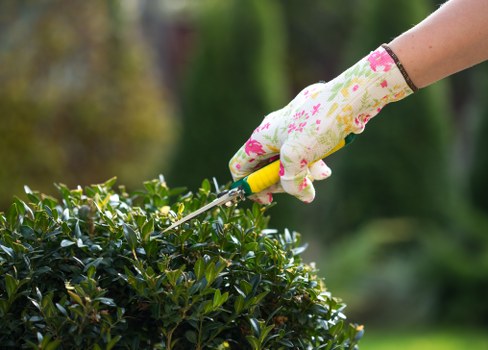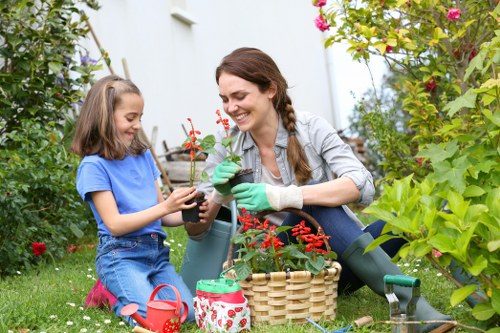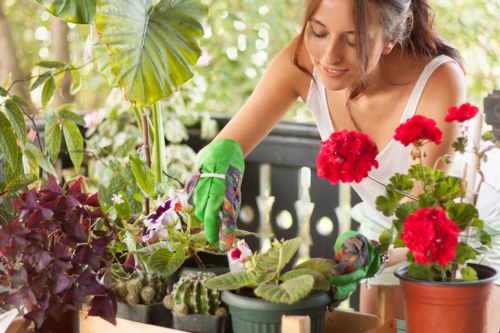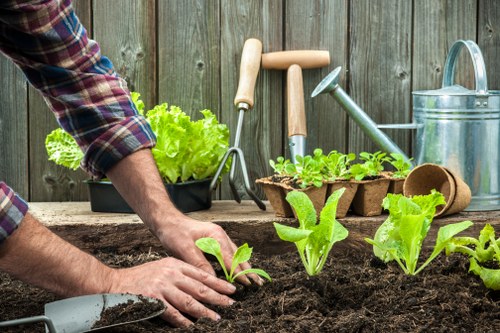Comprehensive Guide to Garden Maintenance in Kenton

Introduction to Garden Maintenance
Maintaining a beautiful garden in Kenton requires a blend of passion, knowledge, and regular upkeep. Whether you're a seasoned gardener or a beginner, understanding the essentials of garden maintenance ensures your outdoor space remains vibrant and healthy throughout the year.
From soil preparation to plant selection, each aspect plays a crucial role in the overall health of your garden. Proper maintenance not only enhances the aesthetic appeal but also promotes sustainability and longevity of your plants.
In this article, we'll explore various strategies and tips to help you achieve a well-maintained garden in Kenton, tailored to its unique climate and soil conditions.

Seasonal Garden Care
Spring Maintenance
Spring is the perfect time to rejuvenate your garden after the winter months. Start by clearing any debris and pruning dead branches to encourage new growth.
**Fertilizing** is essential during this season to replenish the soil nutrients. Choose a fertilizer suitable for your specific plant types to promote healthy development.
Additionally, planting new flowers and vegetables can add color and variety to your garden, setting the stage for a thriving summer.
Summer Maintenance
During the hot summer months, focus on adequate watering and controlling pests. Implementing a regular watering schedule ensures your plants receive the necessary moisture without overwatering.
Using mulch can help retain soil moisture and reduce weed growth, making maintenance easier and more efficient.
Keep an eye out for common garden pests and address them promptly to prevent them from causing significant damage.

Essential Tools for Garden Maintenance
Having the right tools is fundamental for effective garden maintenance. Investing in quality equipment can save time and effort while ensuring the best care for your plants.
- Pruners: For trimming and shaping plants.
- Garden Fork: Ideal for aerating soil and removing weeds.
- Watering Can or Hose: Ensures your plants receive adequate hydration.
Regularly maintaining your tools, such as cleaning and sharpening blades, extends their lifespan and improves their functionality.
Consider ergonomic designs to reduce strain during extended gardening sessions, making the process more enjoyable.

Soil Health and Fertilization
The foundation of a healthy garden lies in the quality of the soil. Conducting a soil test helps determine its pH level and nutrient content, guiding your fertilization strategy.
Organic fertilizers are often preferred for their environmental benefits and ability to improve soil structure over time.
Incorporating compost into your garden beds enriches the soil with essential nutrients and promotes beneficial microbial activity.
Regularly amending the soil with organic matter ensures sustained plant health and productivity.

Plant Selection and Care
Choosing the right plants for Kenton's climate is pivotal for a flourishing garden. Opt for native species that are well-adapted to local conditions, reducing the need for excessive watering and maintenance.
Consider the sunlight exposure, soil type, and water requirements of each plant to ensure they thrive in your garden.
Proper spacing and arrangement allow for adequate airflow, minimizing the risk of disease and promoting healthy growth.
- Perennials: Provide long-term beauty with minimal replanting.
- Annuals: Offer vibrant colors and seasonal variety.
- Shrubs and Trees: Add structure and height to your garden landscape.
Regularly monitoring plant health and addressing any issues promptly ensures a vibrant and resilient garden.
Watering Techniques
Effective watering strategies are essential for maintaining a healthy garden. Deep watering encourages strong root systems, making plants more resilient to drought and temperature fluctuations.
Morning is the best time to water your garden, reducing evaporation and allowing foliage to dry before nightfall, which helps prevent fungal diseases.
Implementing drip irrigation systems can provide targeted watering, conserving water and ensuring plants receive consistent moisture.
Adjust your watering schedule based on seasonal changes and rainfall patterns to optimize water usage and plant health.
Pest and Weed Management
Maintaining a pest-free garden is crucial for plant health and productivity. Regularly inspect your plants for signs of pests and address infestations promptly using eco-friendly methods.
- Natural predators: Encourage beneficial insects like ladybugs and bees to control pest populations.
- Organic pesticides: Use minimally invasive treatments to protect your plants without harming the environment.
- Manual removal: Handpick pests and weeds to maintain a healthy garden ecosystem.
Implementing preventative measures, such as proper spacing and sanitation, reduces the likelihood of pest and weed problems, ensuring a thriving garden.
Mulching Benefits
Mulching offers numerous benefits for garden maintenance, including moisture retention, temperature regulation, and weed suppression.
Organic mulches, such as bark or compost, enrich the soil as they decompose, enhancing its fertility and structure.
Applying a layer of mulch around your plants creates a protective barrier, reducing water evaporation and maintaining consistent soil moisture levels.
- Moisture Retention: Keeps the soil hydrated, reducing the need for frequent watering.
- Temperature Regulation: Insulates plant roots from extreme temperatures.
- Weed Suppression: Minimizes weed growth by blocking sunlight.
Regularly replenishing mulch ensures continued benefits and maintains the aesthetic appeal of your garden.
Pruning and Trimming
Pruning is essential for maintaining the shape, health, and productivity of your plants. Proper pruning techniques encourage robust growth and prevent disease propagation.
Remove dead or damaged branches to improve air circulation and allow more sunlight to reach the plant's interior.
When pruning, use sharp and clean tools to make precise cuts, minimizing stress on the plant and promoting rapid healing.
- Timing: Prune during the appropriate season for each plant type.
- Technique: Make clean cuts at the correct angle to encourage healthy regrowth.
- Maintenance: Regularly inspect and trim plants to maintain their desired shape and size.
Consistent pruning enhances the overall appearance and longevity of your garden plants.
Soil Testing and Improvement
Regular soil testing provides valuable insights into the nutrient composition and pH levels of your garden soil. Understanding these factors guides effective soil management and fertilization practices.
Based on soil test results, amend the soil with appropriate organic or inorganic materials to balance nutrient levels and pH.
Incorporate organic matter, such as compost or manure, to improve soil structure, drainage, and fertility.
Maintaining optimal soil conditions ensures robust plant growth and reduces the need for excessive fertilization.
Garden Design and Layout
A well-thought-out garden design enhances both functionality and visual appeal. Consider factors such as plant height, color schemes, and seasonal interest when planning your garden layout.
Incorporate pathways and seating areas to create a welcoming and accessible outdoor space.
Use companion planting techniques to maximize space and encourage beneficial plant interactions.
- Harmony: Choose plants that complement each other in color and texture.
- Functionality: Designate areas for specific activities, such as dining or relaxation.
- Versatility: Incorporate elements that provide year-round interest and adaptability.
A thoughtful garden design ensures a balanced and enjoyable outdoor environment.
Weed Control Strategies
Effective weed control is vital for maintaining the health and appearance of your garden. Weeds compete with your plants for nutrients, water, and light, hindering their growth.
Implementing a combination of mechanical, cultural, and chemical methods provides comprehensive weed management.
Regularly removing weeds by hand or with tools prevents them from establishing and spreading.
- Mulching: Suppresses weed growth by blocking sunlight.
- Crop Rotation: Reduces weed seed banks in the soil.
- Herbicides: Use selective herbicides cautiously to target specific weed types.
Consistent weed control practices ensure a healthy and thriving garden ecosystem.
Integrated Pest Management (IPM)
Integrated Pest Management (IPM) is a sustainable approach to controlling pests by combining biological, cultural, and chemical practices.
Start by identifying the specific pests affecting your garden and understanding their life cycles and behaviors.
Encourage natural predators, such as birds and beneficial insects, to keep pest populations in check.
- Biological Control: Utilize natural enemies to manage pest populations.
- Cultural Practices: Adjust planting schedules and garden hygiene to deter pests.
- Chemical Control: Apply pesticides judiciously, opting for the least toxic options.
Implementing IPM reduces reliance on chemical pesticides, promoting a healthier and more balanced garden environment.
Composting and Organic Matter
Composting transforms organic waste into nutrient-rich soil amendments, enhancing soil fertility and structure.
Set up a compost bin in your garden to recycle kitchen scraps, garden waste, and other organic materials.
Maintain the compost by balancing green and brown materials, ensuring adequate moisture and aeration for efficient decomposition.
- Benefits: Improves soil texture, increases nutrient availability, and promotes beneficial microbial activity.
- Environmentally Friendly: Reduces landfill waste and lowers your garden's carbon footprint.
- Cost-Effective: Provides a free source of organic fertilizer for your plants.
Incorporating compost into your garden maintenance routine fosters a sustainable and productive growing environment.
Lighting and Garden Fixtures
Proper lighting enhances the beauty and functionality of your garden, extending its usability into the evening hours.
Install solar-powered lights along pathways and around seating areas to create a warm and inviting ambiance.
Use spotlights to highlight key features, such as specimen plants or architectural elements, adding depth and interest to your garden design.
- Safety: Well-lit pathways prevent accidents and make your garden safer at night.
- Aesthetic Appeal: Thoughtfully placed lighting accentuates the beauty of your garden.
- Energy Efficiency: Opt for energy-saving lighting options to minimize environmental impact.
Incorporating lighting into your garden maintenance plan enhances both practicality and visual allure.
Hardscaping Elements
Integrating hardscaping elements, such as patios, walkways, and fences, adds structure and functionality to your garden space.
Choose materials that complement your garden's style and are durable enough to withstand Kenton's climate conditions.
Well-designed hardscaping provides designated areas for activities, improving the overall usability of your garden.
- Patios: Create spaces for outdoor dining and relaxation.
- Walkways: Facilitate easy navigation through your garden.
- Fences: Define boundaries and add privacy to your outdoor space.
Incorporating hardscaping elements enhances both the functionality and aesthetic appeal of your garden.
Maintaining Garden Structures
Garden structures such as sheds, pergolas, and trellises require regular maintenance to ensure their longevity and functionality.
Inspect structures for signs of wear, such as rotting wood or rusting metal, and address any issues promptly to prevent further damage.
Cleaning and treating materials with appropriate sealants or paints can protect against the elements and extend the life of your garden structures.
- Sheds: Ensure they are watertight and free from pests.
- Pergolas: Maintain structural integrity and aesthetic appeal.
- Trellises: Regularly check for stability and repair any damaged sections.
Consistent maintenance of garden structures preserves their functionality and enhances the overall garden environment.
Garden Irrigation Systems
Implementing an efficient irrigation system is key to successful garden maintenance, ensuring your plants receive consistent and adequate moisture.
Drip irrigation systems deliver water directly to the plant roots, minimizing evaporation and water waste.
Automated timers can streamline your watering schedule, adjusting for seasonal variations and reducing manual effort.
- Water Conservation: Efficient irrigation reduces overall water usage.
- Plant Health: Consistent watering promotes robust and healthy plant growth.
- Convenience: Automated systems save time and effort in garden maintenance.
Investing in a quality irrigation system enhances the efficiency and effectiveness of your garden maintenance routine.
Final Thoughts on Garden Maintenance
Maintaining a garden in Kenton is a rewarding endeavor that combines creativity, knowledge, and consistent effort. By implementing the strategies outlined in this article, you can achieve a lush, healthy, and aesthetically pleasing garden.
Remember, successful garden maintenance is an ongoing process that adapts to changing seasons and environmental conditions. Stay informed, be proactive, and enjoy the beauty of your flourishing garden.
Ready to transform your garden? Contact us today to schedule a consultation and book your service now!